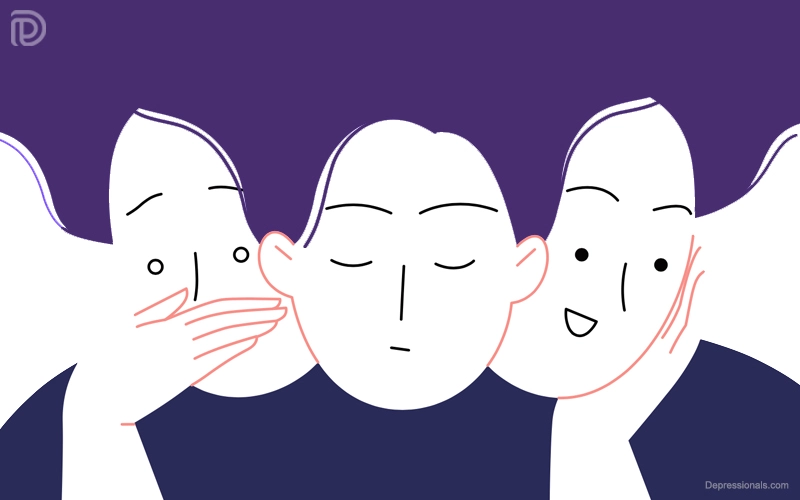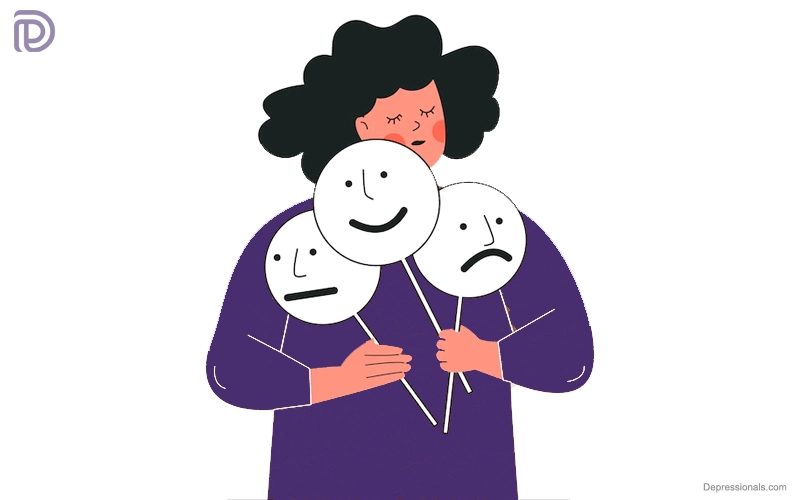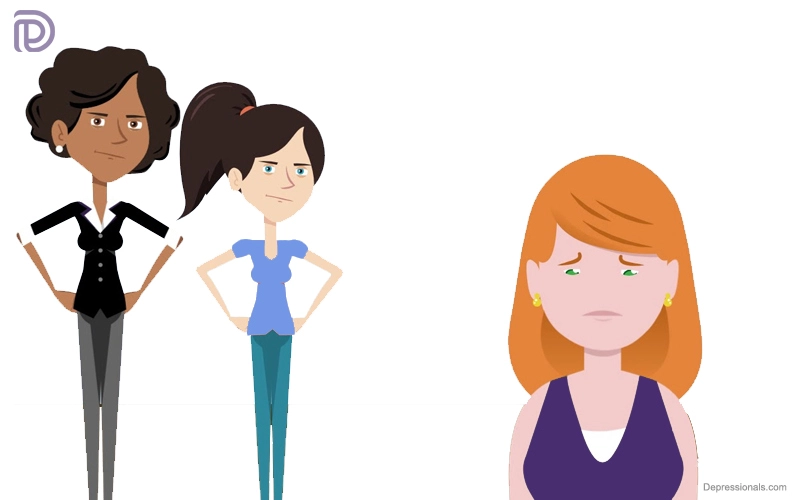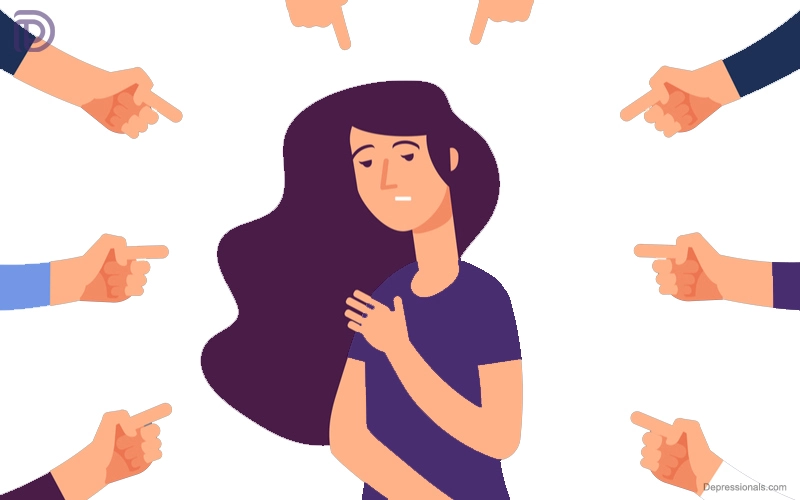Schizoid personality disorder (SPD) is characterized by feelings of social isolation and indifference toward other people. It is described as a disorder that causes people to live in a distant or withdrawn manner, and they tend to avoid social situations.
It is difficult for them to express their emotions, and they lack a strong desire to form personal relationships. People with schizoid personality disorder are also at risk of experiencing depression. Schizoid personality disorder is thought to be a relatively rare personality disorder that affects primarily men.
Read: Immature Personality Disorder
Who does schizoid personality disorder affect?
Schizoid personality disorder usually develops during the teen years when personality continues to develop and mature. However, signs of the condition may appear earlier in life for people who have the disorder.
People assigned male at birth (AMAB) are slightly more likely to suffer from schizoid personality disorder.
Schizoid personality disorder symptoms
Those suffering from schizoid personality disorder usually experience:
- An introspective and fantasy-saturated mind
- Positive criticism or affirmation is indifferent to a person’s sense of indifference
- Separation from other people
- Relationships with others are not as important to them as they should be
- Ignorance of social expectations and norms
- Fun and pleasure activities are infrequently performed
- No enjoyment in family or social relationships
- Affected by lack of interest, withdrawal and aloofness
Read: Separation Anxiety Disorder
Typical onset
The disorder is usually first observed when children are young and becomes apparent by early adulthood. A person suffering from this disorder may face symptoms that affect various aspects of their life including their family relationships, schooling or employment.
As defined by the Diagnostic and Statistical Manual for Mental Disorders, schizoid personality disorder manifests itself as a “pervasive pattern of social and interpersonal deficits characterized by severe difficulty in establishing close relationships as well as cognitive and perceptual distortions.
SPD is usually characterized as cold, aloof, and detached by others. Many people with this disorder prefer being alone, however, some may also feel lonely and isolated due to it.
You should know about Insomnia disorder.
Work-life impact
It also leads to fewer friendships, fewer dates and fewer marriages for those with this disorder. Symptoms of the disorder can also interfere with the ability to work in positions that require a great deal of interaction with others. People suffering from schizoid personality disorder may have more success in careers that involve working alone.
Also, check: Side Effects of Overthinking
Schizoid personality disorder vs. Schizophrenia
SPD is considered part of the schizophrenia spectrum disorder. It shares some characteristics with schizophrenia as well as a schizotypal personality disorder, but some significant distinctions set it apart from these disorders.
SPD patients are rarely paranoid or have hallucinations. However, though they may seem distant and aloof in conversation, their speech is usually comprehensible, which differs from the frequently hard-to-understand patterns of speech associated with schizophrenia.
Difference between social anxiety disorder and schizoid personality disorder
Usually, social anxiety disorder (also referred to as social phobia) is caused by a fear that one will be criticized or judged by others. Whenever possible, they avoid social situations or interactions because of this fear.
Schizoid personality disorder (ScPD) differs from social anxiety disorder in that people with ScPD don’t avoid social situations for fear of judgment or criticism. The reason is that a person is generally not interested in building relationships with others.
Causes of schizoid personality disorder

Schizoid personality disorder has no known cause, but it is believed that a combination of genetics and environment may contribute to this disorder. People’s personalities are created by a wide range of influences, including their genes and upbringing, their experiences as children, their parents’ parenting, their education and their social interactions. SPD may be caused by any of these factors.
Check: Types of Overthinking
SPD diagnosis
Whenever you have concerns about your symptoms, you should consult your doctor first. You will be evaluated by a medical professional and assessed for any underlying illnesses that may be causing your symptoms. Your mental health professional will then likely refer you to you.
As stated in the DSM-5 diagnostic criteria, SPD can be diagnosed if the following symptoms are present:
- Prefers to be alone whenever possible
- An inability to express emotions
- Actively dissatisfied with activities
- Criticism and praise are treated with indifference
- Inability to enjoy close personal relationships
- No interest in sexual relations with other people
- Aside from family, don’t have any close friends
Psychiatrists, psychologists, and other mental health professionals who are trained in the diagnosis and treatment of personality disorders are the most likely to diagnose schizoid personality disorder. The condition is uncommon, and it is often confused with mental disorders other than schizophrenia, so general practitioners are often untrained in diagnosing the condition.
Psychotherapy is rarely sought independently by people with schizoid personality disorder. The condition has often not been treated until a person has suffered serious interruptions in multiple areas of his or her life.
Read: 17 Signs of Materialistic Person
Schizoid personality disorder treatment
There are many challenges associated with treating schizoid personality disorder. The disorder is not commonly treated and sufferers may have difficulty finding a therapist because they find it difficult to establish a working relationship. A schizoid personality disorder is also characterized by social isolation that makes finding help difficult.
Because such relationships do not rely on self-disclosure and emotional intimacy, someone with a schizoid personality disorder may have an easier time forming relationships centered on intellectual, occupational or recreational pursuits.
Anxiety and depression associated with a schizoid personality disorder may be treated with medications. Treatment with these medications is usually coupled with another option, such as cognitive-behavioral therapy (CBT) or group therapy.
SPD sufferers can learn new coping skills through CBT by identifying problematic thoughts and behaviors. People may benefit from practicing interpersonal skills in group therapy.
Social interaction is one of the main concerns with one-on-one therapy for people with this condition. Mental health professionals may be able to provide the most effective treatments when they avoid pushing too hard and don’t put excessive pressure on clients.
Recommended: How to help someone with Depression
Coping with SPD
Since the condition is so severe, you might feel more at ease keeping to yourself and refrain from seeking professional assistance. Individuals with schizoid personality disorder can still feel lonely and isolated even if they prefer solitude. In order to get support, you can do a few things.
Consider joining a group of people who share your interests. People with schizoid personality disorder often find that engaging in occupational or recreational pursuits is easier because they find it easier to establish emotional intimacy. You can build social connections in this way without being overwhelmed.
A loved one with this condition may benefit from your support if you avoid judgment, show patience, and encourage treatment. Try not to make the individual feel uncomfortable or pressed into activities or relationships. Choose activities that will not require you to invest much emotion so you can enjoy spending time together.
Recommended: Multiple Strategies to Control Overthinking
Complications
The main complication of schizoid personality disorder is a lack of social interaction. It is uncommon for people with this personality disorder to be violent since they avoid interacting with others. It is also possible that people with co-occurring disorders such as mood disorders, anxiety disorders, and other personality disorders are more likely to have these conditions than those who do not.
Message from Depressionals
People living with the conditions typically live with it for the rest of their lives, but with proper support and treatment, they can continue to function normally.






You are my breathing in, I own few blogs and rarely run out from to post .
Just desire to say your article is as surprising. The clearness in your post is simply cool and i could assume you’re an expert on this subject. Fine with your permission let me to grab your RSS feed to keep up to date with forthcoming post. Thanks a million and please continue the rewarding work.
The information you have provided is very useful to me.
The information you have provided is very useful to me.
This is very informative.